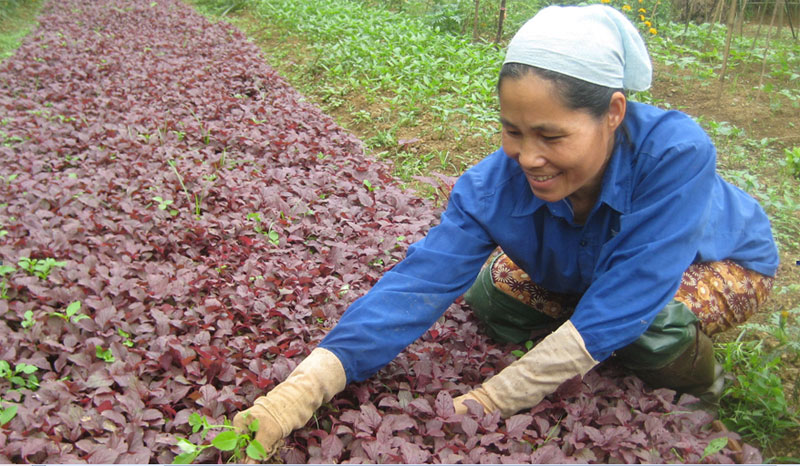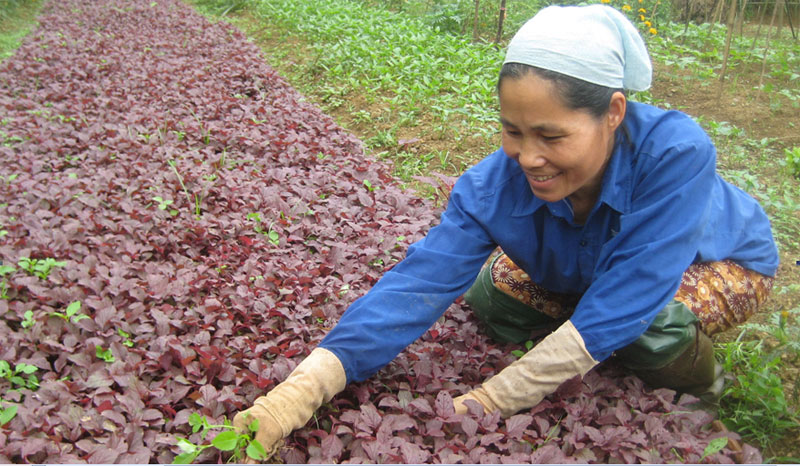
(HBO) – To carry out a scheme on restructuring the agriculture and rural development sector, Lac Thuy district in the northern mountainous province of Hoa Binh is stepping up production in value chain, with safe vegetable cultivation as its top priority.

Farmers in Co Nghia commune, Lac Thuy district, grow safe
vegetables with high economic value
Since
2016, several safe vegetable farming areas have been established in communes
and towns in Lac Thuy district. With cooperatives and cooperative groups as a key
force, the district has grown 10 ha of safe vegetables, including 2.5 ha in Lac
Long commune, 3.5 ha in An Lac commune, 4 ha in Co Nghia commune. Training,
technical guidance and close supervision in fields have helped farmers access
safe growing techniques. Almost vegetables and fruits meet consumers’ demand
such as cabbage, pea, squash, pumpkin, tomato, amaranth, among others. After ensuring
supply, the district inaugurated a safe agricultural product shop in Chi Ne
town where vegetables, fruits, chicken eggs, fowl and cattle meat are available
to make it easier for consumers to buy safe products of clear origin.
Hoang
Dinh Chinh, deputy head of the district’s Division of Agriculture and Rural
Development, said successful cultivation models in 2016 have promoted
production in a value chain. This year, apart from maintaining vegetable
growing chain, the district signed a contract with the Vietnam Chilli Company
to grow 5 ha in An Lac commune. Another contract was inked with the North Green
joint Stock Company to plant 3.6 ha of chilli in Chi Ne town, 5 ha in Lac Long
commune, 6.5 ha in Hung Thi commune and 0.7 ha in Khoan Du commune. At the
price of 5,500 VND per kilogramme, these businesses committed to buying all
products from farmers. In particular, when market prices go up, they pledged to
buy them at 80 percent of the world prices. In return, farmers will sell all
products to the companies.
The chilli
production value chain attracted 632 labourers from cooperatives and households
with a total investment of around 500 million VND. The district People’s
Committee offered technical training support and all seedlings, materials and
fertilisers in the first stage. Farmers invested in organic fertilisers and
manual jobs. The chain started by opening a training course on safe vegetable
farming. The first crop is scheduled for growing in November 2017 and harvesting
in the next 60 days. With an output of 1-1.2 tonnes per 360 sq.m, each ha of
chilli earns more than 160 million VND. When costs are excluded, farmers earn
at least 120 million VND in profit.
By 2020,
the district strives to grow 150-200 ha of safe vegetables./.
According to data from the Hoa Binh Provincial Party Committee, the industrial production index for the first six months of 2025 is estimated to have increased by 20% compared to the same period last year. This marks the highest year-on-year growth rate for this period since 2020.
In the first six months of 2025, Hoa Binh province’s export turnover was estimated at 1.145 billion USD, marking an 18.11% increase compared to the same period in 2024. Import turnover was estimated at $ 804 million, a 17.15% increase, which helped the province maintain a positive trade balance.
The lives of the ethnic minority farmers in Tan Lac district have gradually improved thanks to the new directions in agricultural production. This is a testament to the collective strength fostered through the professional associations and groups implemented by various levels of the district’s Farmers’ Union.
With the motto the "product quality comes first,” after nearly one year of establishment and operation, Muong village’s Clean Food Agricultural and Commercial Cooperative, located in Cau Hamlet, Hung Son Commune (Kim Boi district), has launched reputable, high-quality agricultural products to the market that are well-received by consumers. The products such as Muong village’s pork sausage, salt-cured chicken, and salt-cured pork hocks have gradually carved out a place in the market and they are on the path to obtaining the OCOP certification.
In the past, the phrase "bumper harvest, rock-bottom prices" was a familiar refrain for Vietnamese farmers engaged in fragmented, small-scale agriculture. But today, a new spirit is emerging across rural areas of Hoa Binh province - one of collaboration, organisation, and collective economic models that provide a stable foundation for production.
Maintaining growing area codes and packing facility codes in accordance with regulations is a mandatory requirement for agricultural products to be eligible for export. Recently, the Department of Agriculture and Environment of Hoa Binh province has intensified technical supervision of designated farming areas and packing facilities to safeguard the "green passport" that enables its products to access international markets.



